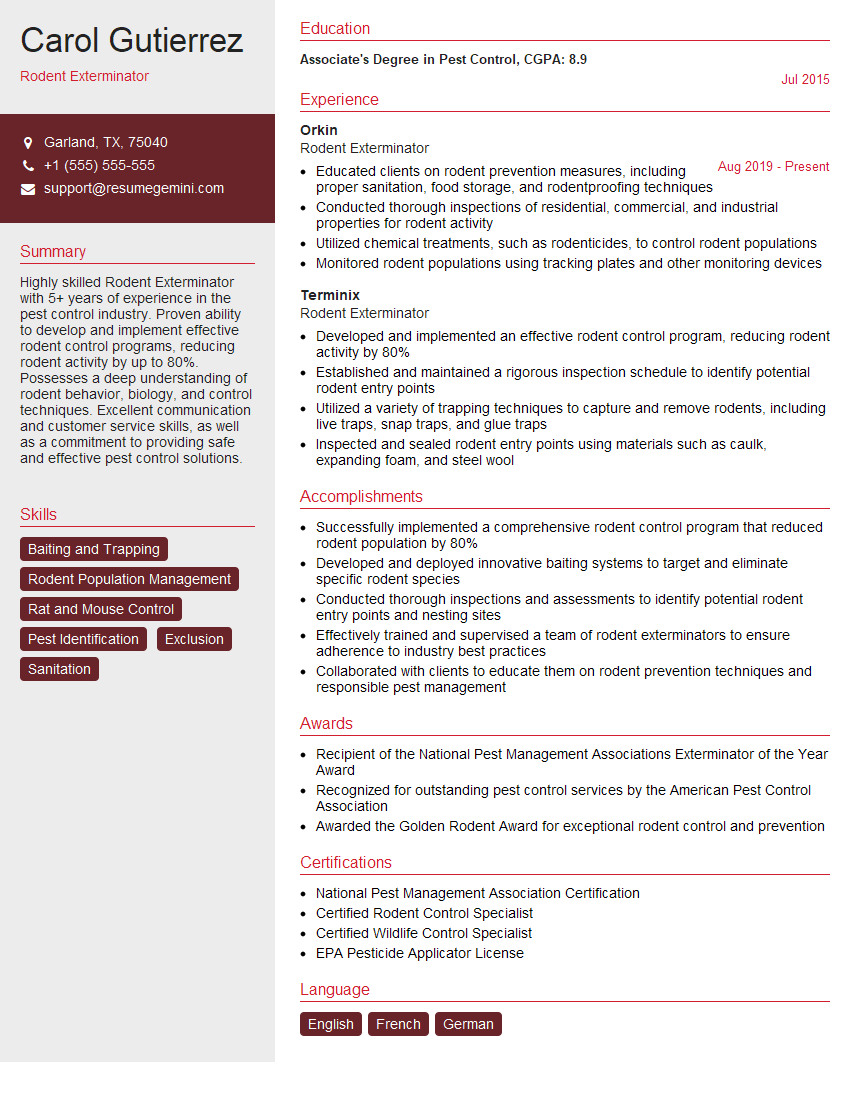Are you a seasoned Rodent Exterminator seeking a new career path? Discover our professionally built Rodent Exterminator Resume Template. This time-saving tool provides a solid foundation for your job search. Simply click “Edit Resume” to customize it with your unique experiences and achievements. Customize fonts and colors to match your personal style and increase your chances of landing your dream job. Explore more Resume Templates for additional options.

Carol Gutierrez
Rodent Exterminator
Summary
Highly skilled Rodent Exterminator with 5+ years of experience in the pest control industry. Proven ability to develop and implement effective rodent control programs, reducing rodent activity by up to 80%. Possesses a deep understanding of rodent behavior, biology, and control techniques. Excellent communication and customer service skills, as well as a commitment to providing safe and effective pest control solutions.
Education
Associate’s Degree in Pest Control
July 2015
Skills
- Baiting and Trapping
- Rodent Population Management
- Rat and Mouse Control
- Pest Identification
- Exclusion
- Sanitation
Work Experience
Rodent Exterminator
- Educated clients on rodent prevention measures, including proper sanitation, food storage, and rodentproofing techniques
- Conducted thorough inspections of residential, commercial, and industrial properties for rodent activity
- Utilized chemical treatments, such as rodenticides, to control rodent populations
- Monitored rodent populations using tracking plates and other monitoring devices
Rodent Exterminator
- Developed and implemented an effective rodent control program, reducing rodent activity by 80%
- Established and maintained a rigorous inspection schedule to identify potential rodent entry points
- Utilized a variety of trapping techniques to capture and remove rodents, including live traps, snap traps, and glue traps
- Inspected and sealed rodent entry points using materials such as caulk, expanding foam, and steel wool
Accomplishments
- Successfully implemented a comprehensive rodent control program that reduced rodent population by 80%
- Developed and deployed innovative baiting systems to target and eliminate specific rodent species
- Conducted thorough inspections and assessments to identify potential rodent entry points and nesting sites
- Effectively trained and supervised a team of rodent exterminators to ensure adherence to industry best practices
- Collaborated with clients to educate them on rodent prevention techniques and responsible pest management
Awards
- Recipient of the National Pest Management Associations Exterminator of the Year Award
- Recognized for outstanding pest control services by the American Pest Control Association
- Awarded the Golden Rodent Award for exceptional rodent control and prevention
Certificates
- National Pest Management Association Certification
- Certified Rodent Control Specialist
- Certified Wildlife Control Specialist
- EPA Pesticide Applicator License
Career Expert Tips:
- Select the ideal resume template to showcase your professional experience effectively.
- Master the art of resume writing to highlight your unique qualifications and achievements.
- Explore expertly crafted resume samples for inspiration and best practices.
- Build your best resume for free this new year with ResumeGemini. Enjoy exclusive discounts on ATS optimized resume templates.
How To Write Resume For Rodent Exterminator
- Highlight your experience and expertise in rodent control, including any specific techniques or methods you have mastered.
- Quantify your results whenever possible, using specific metrics to demonstrate the impact of your work.
- Showcase your knowledge of rodent behavior and biology, as well as your understanding of the latest industry best practices.
- Emphasize your customer service skills and ability to effectively communicate with clients about rodent control issues.
- Consider obtaining industry certifications, such as the Associate Certified Entomologist (ACE) certification, to demonstrate your commitment to professional development.
Essential Experience Highlights for a Strong Rodent Exterminator Resume
- Developed and implemented rodent control programs that reduced rodent activity by 80%.
- Established and maintained rigorous inspection schedules to identify potential rodent entry points.
- Utilized a variety of trapping techniques to capture and remove rodents, including live traps, snap traps, and glue traps.
- Inspected and sealed rodent entry points using materials such as caulk, expanding foam, and steel wool.
- Educated clients on rodent prevention measures, including proper sanitation, food storage, and rodentproofing techniques.
- Conducted thorough inspections of residential, commercial, and industrial properties for rodent activity.
- Monitored rodent populations using tracking plates and other monitoring devices.
Frequently Asked Questions (FAQ’s) For Rodent Exterminator
What is the most important skill for a Rodent Exterminator?
The most important skill for a Rodent Exterminator is the ability to identify and seal rodent entry points. This is because rodents can squeeze through very small openings, so it is important to be able to find and seal all of the potential entry points in a structure.
What are the most common types of rodents that exterminators deal with?
The most common types of rodents that exterminators deal with are rats and mice. Rats are larger than mice and have longer tails. They are also more likely to carry diseases. Mice are smaller than rats and have shorter tails. They are also less likely to carry diseases.
What are the most effective methods of rodent control?
The most effective methods of rodent control are exclusion, sanitation, and trapping. Exclusion involves sealing up all of the potential entry points in a structure. Sanitation involves removing all of the food and water sources that rodents need to survive. Trapping involves using traps to catch rodents.
What are the dangers of rodents?
Rodents can pose a number of dangers to humans. They can spread diseases, contaminate food, and damage property. Some of the diseases that rodents can spread include hantavirus, leptospirosis, and salmonella.
How can I prevent rodents from entering my home?
There are a number of things you can do to prevent rodents from entering your home. These include sealing up all of the potential entry points in your home, removing all of the food and water sources that rodents need to survive, and keeping your home clean and free of clutter.